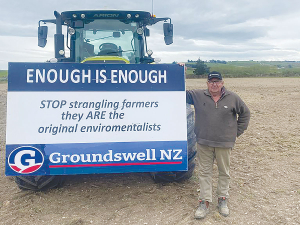Groundswell co-founder Bryce McKenzie says the government’s continued plans for emissions pricing are as bad for farmers as Labour’s plan.
McKenzie, an Otago farmer, says the Government’s emissions reduction plan will mean higher food prices for Kiwis, with no benefit to global emissions.
The updated plan, announced today, will see agricultural emissions pricing introduced by 2030 along with incentives to take up new technologies.
Climate Change Minister Simon Watts claims the plan sets the foundation for meeting the government's net zero 2050 target as early as 2044.
“New Zealand needs to be stronger in a changing climate. We want our way of life to be protected and minimise the impacts of climate change to our country,” Watts says.
“We can have affordable and secure clean energy, an efficient competitive agriculture sector, and a booming economy while meeting our climate change commitments. This plan sets out how we can get there.”
However, McKenzie says that while supporting research into emissions reduction innovation is good, Kiwi farmers are already the most efficient in the world and have strong incentives to hold that position by taking up new technologies once they are proven safe, effective and desired by consumers.
“This Government, like the last one, is pretending there is some way a price on agricultural emissions – a Farming Tax – can work without making the food we produce in New Zealand more expensive and less competitive overseas, sending production offshore,” he says.
"Any reduced production here will just be taken up by less efficient foreign farmers who emit more for the same amount of food and chop down rainforests to make room for their larger, less efficient herds and flocks.”
"If the goal is decreasing the world’s total food emissions, the politicians clapping for Simon Watts at overseas conferences should be removing trade barriers so our lower-emissions food can compete fairly in their markets," he concludes.



















